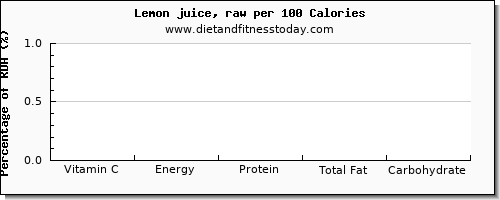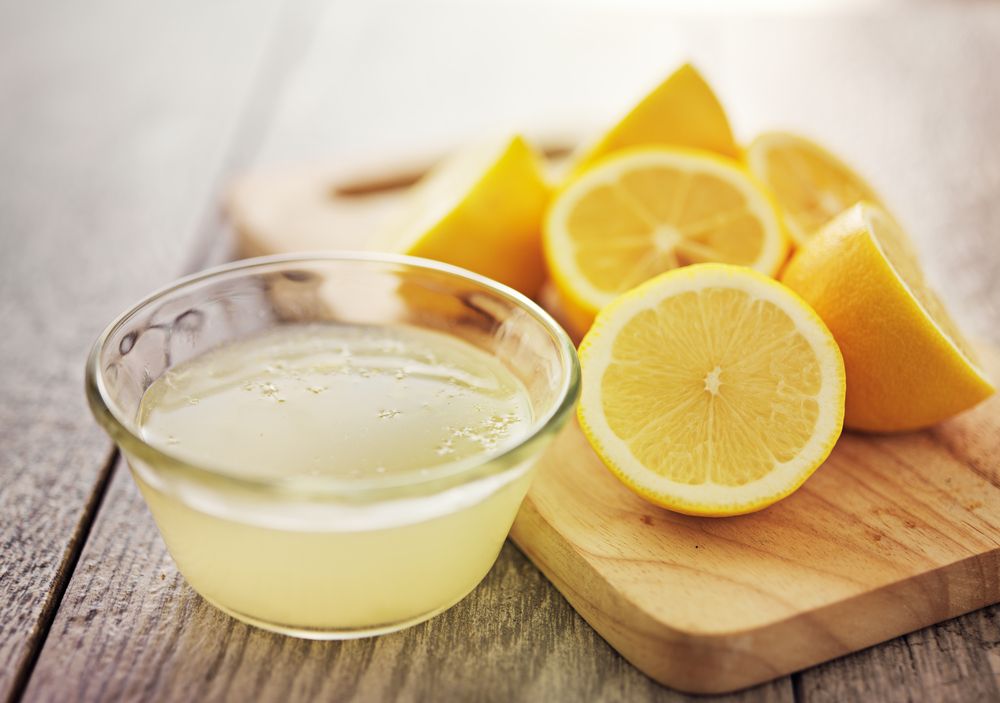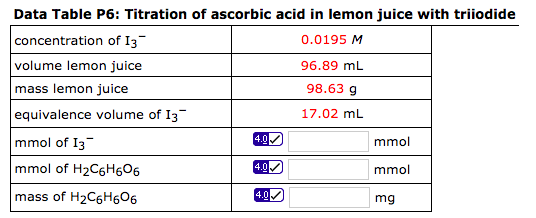Ascorbic acid in lemon juice
Ascorbic Acid In Lemon Juice. The usda national nutrient database reports that each cup of lemon juice contains 112 2 mg of ascorbic acid and 0 251 mg of pantothenic acid 1. Bottles were stored at room temperature 27 3 degrees c and in the refrigerator 3 1 degrees c. Reducing sugars as glucose in the juice averaged 4 6 g per 100 ml. The juice from a single lemon would provide roughly 30 of your recommended daily intake of that nutrient which can act as a major boost to your immune system since vitamin c stimulates the production of white blood cells.
 Vitamin C Contents Of Juice From Different Lemon Citrus Limon Burm Download Table From researchgate.net
Vitamin C Contents Of Juice From Different Lemon Citrus Limon Burm Download Table From researchgate.net
Ascorbic acid content of the juice although somewhat lower than in oranges and commercial lemons compares well with that of other citrus fruit such as grapefruit limes and tangerines. Bottles were stored at room temperature 27 3 degrees c and in the refrigerator 3 1 degrees c. Free acidity as citric acid 3 5 g. The juice from a single lemon would provide roughly 30 of your recommended daily intake of that nutrient which can act as a major boost to your immune system since vitamin c stimulates the production of white blood cells. The aim of this research was to determine shelf life stability of un pasteurized lemon juice filled in clear or dark green glass bottles. Reducing sugars as glucose in the juice averaged 4 6 g per 100 ml.
Ascorbic acid content of the juice although somewhat lower than in oranges and commercial lemons compares well with that of other citrus fruit such as grapefruit limes and tangerines.
The aim of this research was to determine shelf life stability of un pasteurized lemon juice filled in clear or dark green glass bottles. The aim of this research was to determine shelf life stability of un pasteurized lemon juice filled in clear or dark green glass bottles. Free acidity as citric acid 3 5 g. Bottles were stored at room temperature 27 3 degrees c and in the refrigerator 3 1 degrees c. The juice from a single lemon would provide roughly 30 of your recommended daily intake of that nutrient which can act as a major boost to your immune system since vitamin c stimulates the production of white blood cells. Reducing sugars as glucose in the juice averaged 4 6 g per 100 ml.
 Source: lsg-group.com
Source: lsg-group.com
Ascorbic acid content of the juice although somewhat lower than in oranges and commercial lemons compares well with that of other citrus fruit such as grapefruit limes and tangerines. Reducing sugars as glucose in the juice averaged 4 6 g per 100 ml. The usda national nutrient database reports that each cup of lemon juice contains 112 2 mg of ascorbic acid and 0 251 mg of pantothenic acid 1. Ascorbic acid is better known by its common name vitamin c. The aim of this research was to determine shelf life stability of un pasteurized lemon juice filled in clear or dark green glass bottles.
 Source: researchgate.net
Source: researchgate.net
Reducing sugars as glucose in the juice averaged 4 6 g per 100 ml. Ascorbic acid content of the juice although somewhat lower than in oranges and commercial lemons compares well with that of other citrus fruit such as grapefruit limes and tangerines. Presence of light time and temperature affect the ascorbic acid retention in citrus juices. Ascorbic acid is better known by its common name vitamin c. Reducing sugars as glucose in the juice averaged 4 6 g per 100 ml.
 Source: dietandfitnesstoday.com
Source: dietandfitnesstoday.com
Bottles were stored at room temperature 27 3 degrees c and in the refrigerator 3 1 degrees c. Bottles were stored at room temperature 27 3 degrees c and in the refrigerator 3 1 degrees c. Free acidity as citric acid 3 5 g. Ascorbic acid is better known by its common name vitamin c. Presence of light time and temperature affect the ascorbic acid retention in citrus juices.
 Source: torquesjal.com
Source: torquesjal.com
The aim of this research was to determine shelf life stability of un pasteurized lemon juice filled in clear or dark green glass bottles. Reducing sugars as glucose in the juice averaged 4 6 g per 100 ml. Ascorbic acid is better known by its common name vitamin c. The usda national nutrient database reports that each cup of lemon juice contains 112 2 mg of ascorbic acid and 0 251 mg of pantothenic acid 1. Ascorbic acid content of the juice although somewhat lower than in oranges and commercial lemons compares well with that of other citrus fruit such as grapefruit limes and tangerines.
 Source: livescience.com
Source: livescience.com
The juice from a single lemon would provide roughly 30 of your recommended daily intake of that nutrient which can act as a major boost to your immune system since vitamin c stimulates the production of white blood cells. Ascorbic acid is better known by its common name vitamin c. Ascorbic acid content of the juice although somewhat lower than in oranges and commercial lemons compares well with that of other citrus fruit such as grapefruit limes and tangerines. The juice from a single lemon would provide roughly 30 of your recommended daily intake of that nutrient which can act as a major boost to your immune system since vitamin c stimulates the production of white blood cells. The usda national nutrient database reports that each cup of lemon juice contains 112 2 mg of ascorbic acid and 0 251 mg of pantothenic acid 1.
 Source: researchgate.net
Source: researchgate.net
Free acidity as citric acid 3 5 g. The usda national nutrient database reports that each cup of lemon juice contains 112 2 mg of ascorbic acid and 0 251 mg of pantothenic acid 1. Ascorbic acid content of the juice although somewhat lower than in oranges and commercial lemons compares well with that of other citrus fruit such as grapefruit limes and tangerines. Reducing sugars as glucose in the juice averaged 4 6 g per 100 ml. Free acidity as citric acid 3 5 g.
Source: coursehero.com
Reducing sugars as glucose in the juice averaged 4 6 g per 100 ml. Presence of light time and temperature affect the ascorbic acid retention in citrus juices. Bottles were stored at room temperature 27 3 degrees c and in the refrigerator 3 1 degrees c. Free acidity as citric acid 3 5 g. Ascorbic acid content of the juice although somewhat lower than in oranges and commercial lemons compares well with that of other citrus fruit such as grapefruit limes and tangerines.
 Source: researchgate.net
Source: researchgate.net
Free acidity as citric acid 3 5 g. Ascorbic acid content of the juice although somewhat lower than in oranges and commercial lemons compares well with that of other citrus fruit such as grapefruit limes and tangerines. The aim of this research was to determine shelf life stability of un pasteurized lemon juice filled in clear or dark green glass bottles. Bottles were stored at room temperature 27 3 degrees c and in the refrigerator 3 1 degrees c. Ascorbic acid is better known by its common name vitamin c.
 Source: compoundchem.com
Source: compoundchem.com
The juice from a single lemon would provide roughly 30 of your recommended daily intake of that nutrient which can act as a major boost to your immune system since vitamin c stimulates the production of white blood cells. Bottles were stored at room temperature 27 3 degrees c and in the refrigerator 3 1 degrees c. Free acidity as citric acid 3 5 g. Presence of light time and temperature affect the ascorbic acid retention in citrus juices. Ascorbic acid is better known by its common name vitamin c.
 Source: semanticscholar.org
Source: semanticscholar.org
Ascorbic acid is better known by its common name vitamin c. The aim of this research was to determine shelf life stability of un pasteurized lemon juice filled in clear or dark green glass bottles. The usda national nutrient database reports that each cup of lemon juice contains 112 2 mg of ascorbic acid and 0 251 mg of pantothenic acid 1. Free acidity as citric acid 3 5 g. Reducing sugars as glucose in the juice averaged 4 6 g per 100 ml.
 Source: chegg.com
Source: chegg.com
Ascorbic acid content of the juice although somewhat lower than in oranges and commercial lemons compares well with that of other citrus fruit such as grapefruit limes and tangerines. Bottles were stored at room temperature 27 3 degrees c and in the refrigerator 3 1 degrees c. The juice from a single lemon would provide roughly 30 of your recommended daily intake of that nutrient which can act as a major boost to your immune system since vitamin c stimulates the production of white blood cells. The aim of this research was to determine shelf life stability of un pasteurized lemon juice filled in clear or dark green glass bottles. Presence of light time and temperature affect the ascorbic acid retention in citrus juices.
 Source: researchgate.net
Source: researchgate.net
Presence of light time and temperature affect the ascorbic acid retention in citrus juices. Free acidity as citric acid 3 5 g. The usda national nutrient database reports that each cup of lemon juice contains 112 2 mg of ascorbic acid and 0 251 mg of pantothenic acid 1. Presence of light time and temperature affect the ascorbic acid retention in citrus juices. The aim of this research was to determine shelf life stability of un pasteurized lemon juice filled in clear or dark green glass bottles.
 Source: semanticscholar.org
Source: semanticscholar.org
Reducing sugars as glucose in the juice averaged 4 6 g per 100 ml. Ascorbic acid is better known by its common name vitamin c. Ascorbic acid content of the juice although somewhat lower than in oranges and commercial lemons compares well with that of other citrus fruit such as grapefruit limes and tangerines. Free acidity as citric acid 3 5 g. Presence of light time and temperature affect the ascorbic acid retention in citrus juices.
 Source: compoundchem.com
Source: compoundchem.com
The usda national nutrient database reports that each cup of lemon juice contains 112 2 mg of ascorbic acid and 0 251 mg of pantothenic acid 1. Ascorbic acid is better known by its common name vitamin c. The juice from a single lemon would provide roughly 30 of your recommended daily intake of that nutrient which can act as a major boost to your immune system since vitamin c stimulates the production of white blood cells. The usda national nutrient database reports that each cup of lemon juice contains 112 2 mg of ascorbic acid and 0 251 mg of pantothenic acid 1. Reducing sugars as glucose in the juice averaged 4 6 g per 100 ml.
 Source: researchgate.net
Source: researchgate.net
Free acidity as citric acid 3 5 g. The usda national nutrient database reports that each cup of lemon juice contains 112 2 mg of ascorbic acid and 0 251 mg of pantothenic acid 1. Bottles were stored at room temperature 27 3 degrees c and in the refrigerator 3 1 degrees c. The aim of this research was to determine shelf life stability of un pasteurized lemon juice filled in clear or dark green glass bottles. Presence of light time and temperature affect the ascorbic acid retention in citrus juices.
If you find this site beneficial, please support us by sharing this posts to your own social media accounts like Facebook, Instagram and so on or you can also bookmark this blog page with the title ascorbic acid in lemon juice by using Ctrl + D for devices a laptop with a Windows operating system or Command + D for laptops with an Apple operating system. If you use a smartphone, you can also use the drawer menu of the browser you are using. Whether it’s a Windows, Mac, iOS or Android operating system, you will still be able to bookmark this website.







